Microeconomics Principles (ECON111) Assignment: Cashless Debit Card
VerifiedAdded on 2022/12/22
|9
|2223
|1
Essay
AI Summary
This assignment analyzes the Australian government's implementation of the cashless debit card for welfare payments, examining its economic justifications, ethical implications, and consistency with standard economic arguments. The analysis includes a microeconomic perspective, utilizing diagrams to illustrate budget constraints and consumer choices. It explores the ethical framework underlying the program, considering whether the system is justifiable on balance, and discusses arguments for and against the program based on different ethical perspectives. The assignment also addresses the question of whether the card should be applied to all government payment recipients, such as pensioners and students, and provides a detailed explanation of the rationale behind the conclusions. The student explores the arguments against the program and discusses alternative ethical frameworks to evaluate the program's impact on the freedom of choice and welfare of beneficiaries.
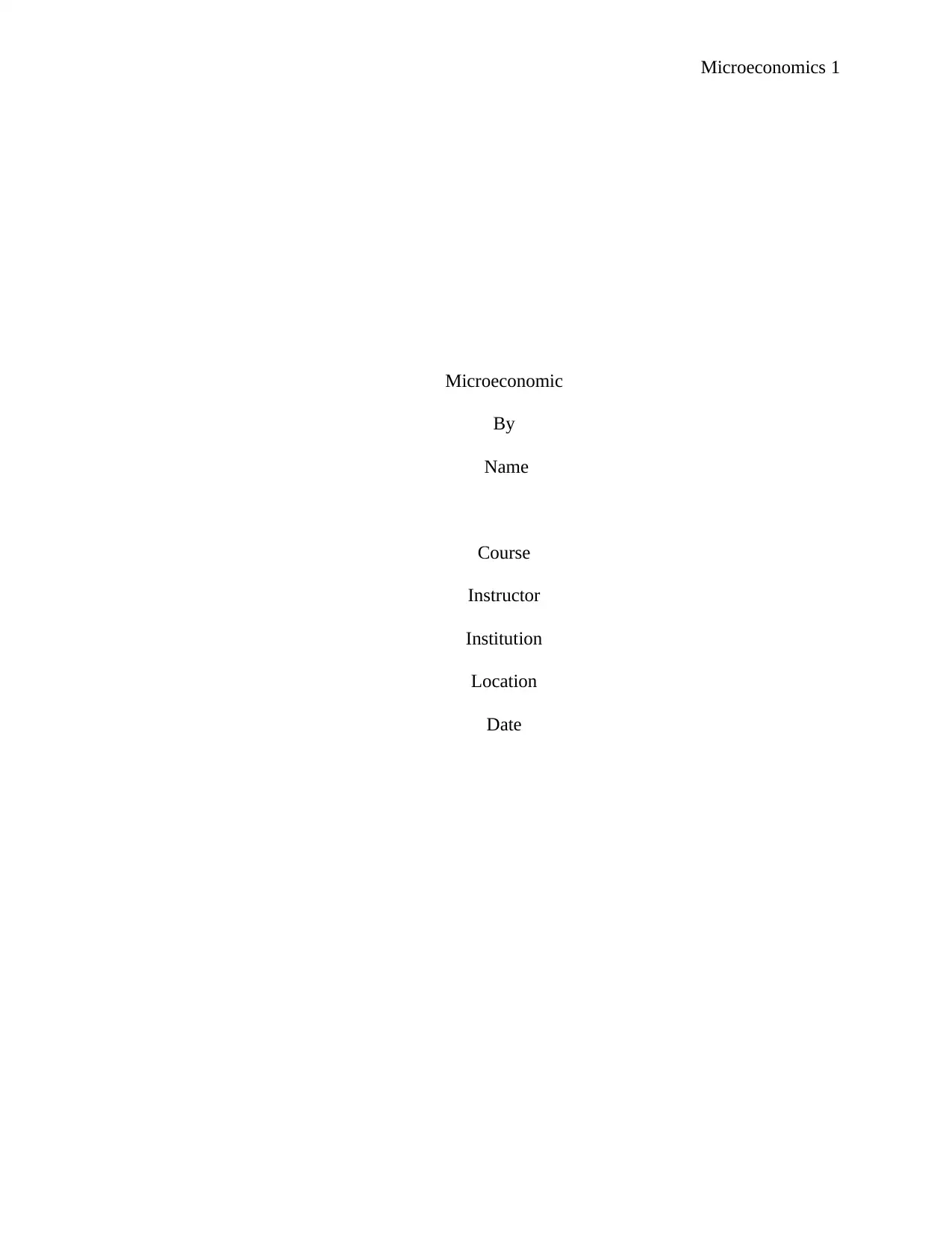
Microeconomics 1
Microeconomic
By
Name
Course
Instructor
Institution
Location
Date
Microeconomic
By
Name
Course
Instructor
Institution
Location
Date
Paraphrase This Document
Need a fresh take? Get an instant paraphrase of this document with our AI Paraphraser
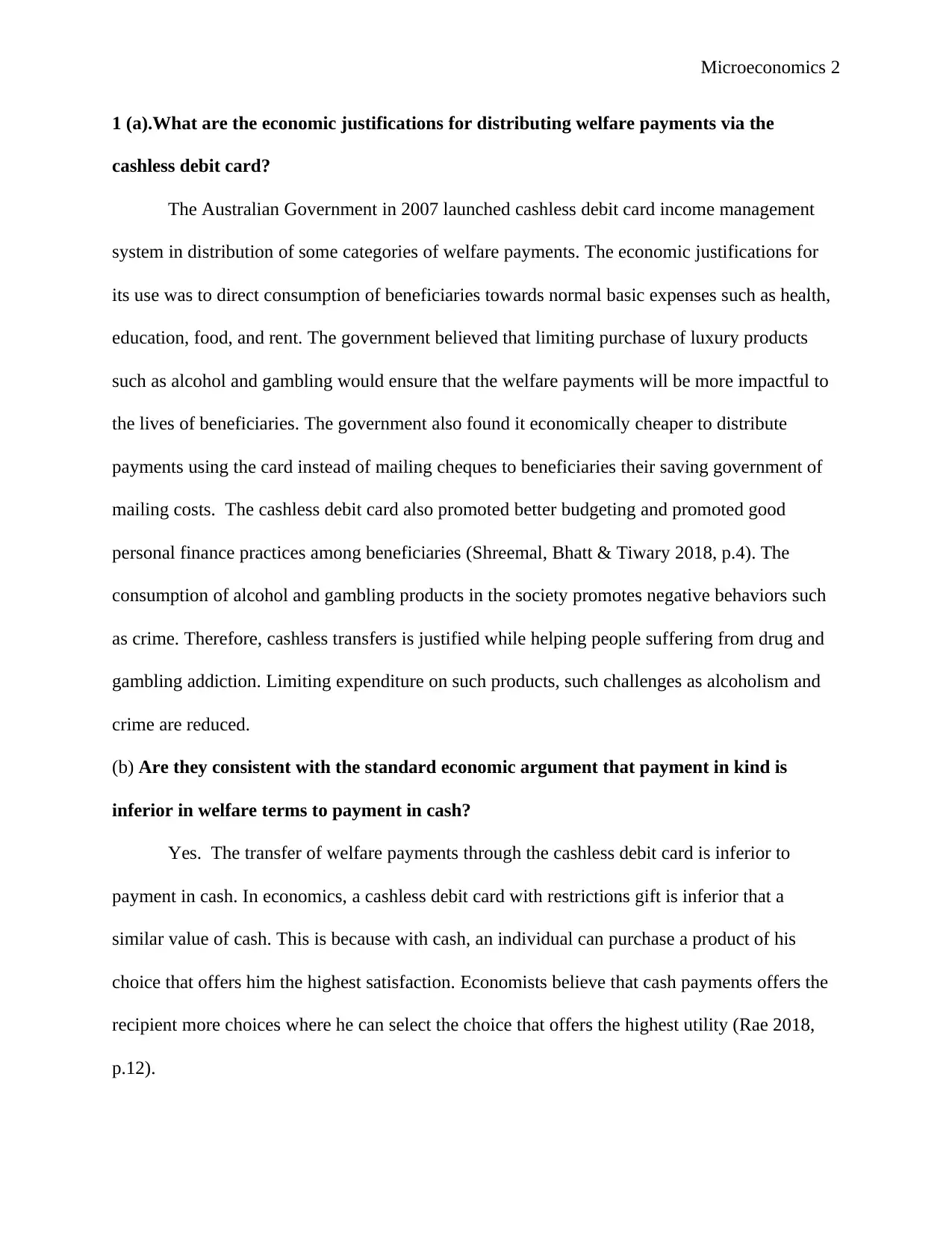
Microeconomics 2
1 (a).What are the economic justifications for distributing welfare payments via the
cashless debit card?
The Australian Government in 2007 launched cashless debit card income management
system in distribution of some categories of welfare payments. The economic justifications for
its use was to direct consumption of beneficiaries towards normal basic expenses such as health,
education, food, and rent. The government believed that limiting purchase of luxury products
such as alcohol and gambling would ensure that the welfare payments will be more impactful to
the lives of beneficiaries. The government also found it economically cheaper to distribute
payments using the card instead of mailing cheques to beneficiaries their saving government of
mailing costs. The cashless debit card also promoted better budgeting and promoted good
personal finance practices among beneficiaries (Shreemal, Bhatt & Tiwary 2018, p.4). The
consumption of alcohol and gambling products in the society promotes negative behaviors such
as crime. Therefore, cashless transfers is justified while helping people suffering from drug and
gambling addiction. Limiting expenditure on such products, such challenges as alcoholism and
crime are reduced.
(b) Are they consistent with the standard economic argument that payment in kind is
inferior in welfare terms to payment in cash?
Yes. The transfer of welfare payments through the cashless debit card is inferior to
payment in cash. In economics, a cashless debit card with restrictions gift is inferior that a
similar value of cash. This is because with cash, an individual can purchase a product of his
choice that offers him the highest satisfaction. Economists believe that cash payments offers the
recipient more choices where he can select the choice that offers the highest utility (Rae 2018,
p.12).
1 (a).What are the economic justifications for distributing welfare payments via the
cashless debit card?
The Australian Government in 2007 launched cashless debit card income management
system in distribution of some categories of welfare payments. The economic justifications for
its use was to direct consumption of beneficiaries towards normal basic expenses such as health,
education, food, and rent. The government believed that limiting purchase of luxury products
such as alcohol and gambling would ensure that the welfare payments will be more impactful to
the lives of beneficiaries. The government also found it economically cheaper to distribute
payments using the card instead of mailing cheques to beneficiaries their saving government of
mailing costs. The cashless debit card also promoted better budgeting and promoted good
personal finance practices among beneficiaries (Shreemal, Bhatt & Tiwary 2018, p.4). The
consumption of alcohol and gambling products in the society promotes negative behaviors such
as crime. Therefore, cashless transfers is justified while helping people suffering from drug and
gambling addiction. Limiting expenditure on such products, such challenges as alcoholism and
crime are reduced.
(b) Are they consistent with the standard economic argument that payment in kind is
inferior in welfare terms to payment in cash?
Yes. The transfer of welfare payments through the cashless debit card is inferior to
payment in cash. In economics, a cashless debit card with restrictions gift is inferior that a
similar value of cash. This is because with cash, an individual can purchase a product of his
choice that offers him the highest satisfaction. Economists believe that cash payments offers the
recipient more choices where he can select the choice that offers the highest utility (Rae 2018,
p.12).
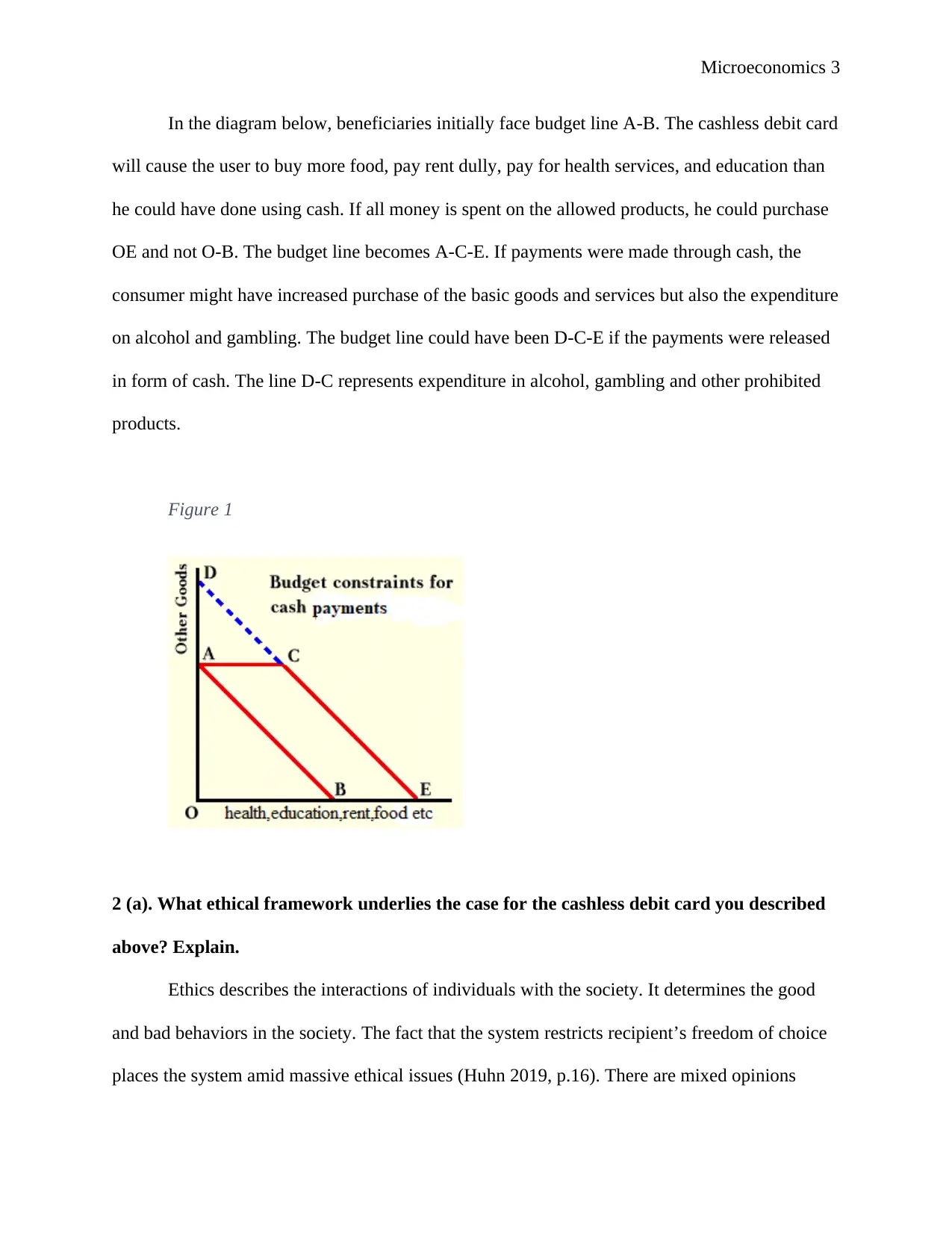
Microeconomics 3
In the diagram below, beneficiaries initially face budget line A-B. The cashless debit card
will cause the user to buy more food, pay rent dully, pay for health services, and education than
he could have done using cash. If all money is spent on the allowed products, he could purchase
OE and not O-B. The budget line becomes A-C-E. If payments were made through cash, the
consumer might have increased purchase of the basic goods and services but also the expenditure
on alcohol and gambling. The budget line could have been D-C-E if the payments were released
in form of cash. The line D-C represents expenditure in alcohol, gambling and other prohibited
products.
Figure 1
2 (a). What ethical framework underlies the case for the cashless debit card you described
above? Explain.
Ethics describes the interactions of individuals with the society. It determines the good
and bad behaviors in the society. The fact that the system restricts recipient’s freedom of choice
places the system amid massive ethical issues (Huhn 2019, p.16). There are mixed opinions
In the diagram below, beneficiaries initially face budget line A-B. The cashless debit card
will cause the user to buy more food, pay rent dully, pay for health services, and education than
he could have done using cash. If all money is spent on the allowed products, he could purchase
OE and not O-B. The budget line becomes A-C-E. If payments were made through cash, the
consumer might have increased purchase of the basic goods and services but also the expenditure
on alcohol and gambling. The budget line could have been D-C-E if the payments were released
in form of cash. The line D-C represents expenditure in alcohol, gambling and other prohibited
products.
Figure 1
2 (a). What ethical framework underlies the case for the cashless debit card you described
above? Explain.
Ethics describes the interactions of individuals with the society. It determines the good
and bad behaviors in the society. The fact that the system restricts recipient’s freedom of choice
places the system amid massive ethical issues (Huhn 2019, p.16). There are mixed opinions
⊘ This is a preview!⊘
Do you want full access?
Subscribe today to unlock all pages.

Trusted by 1+ million students worldwide
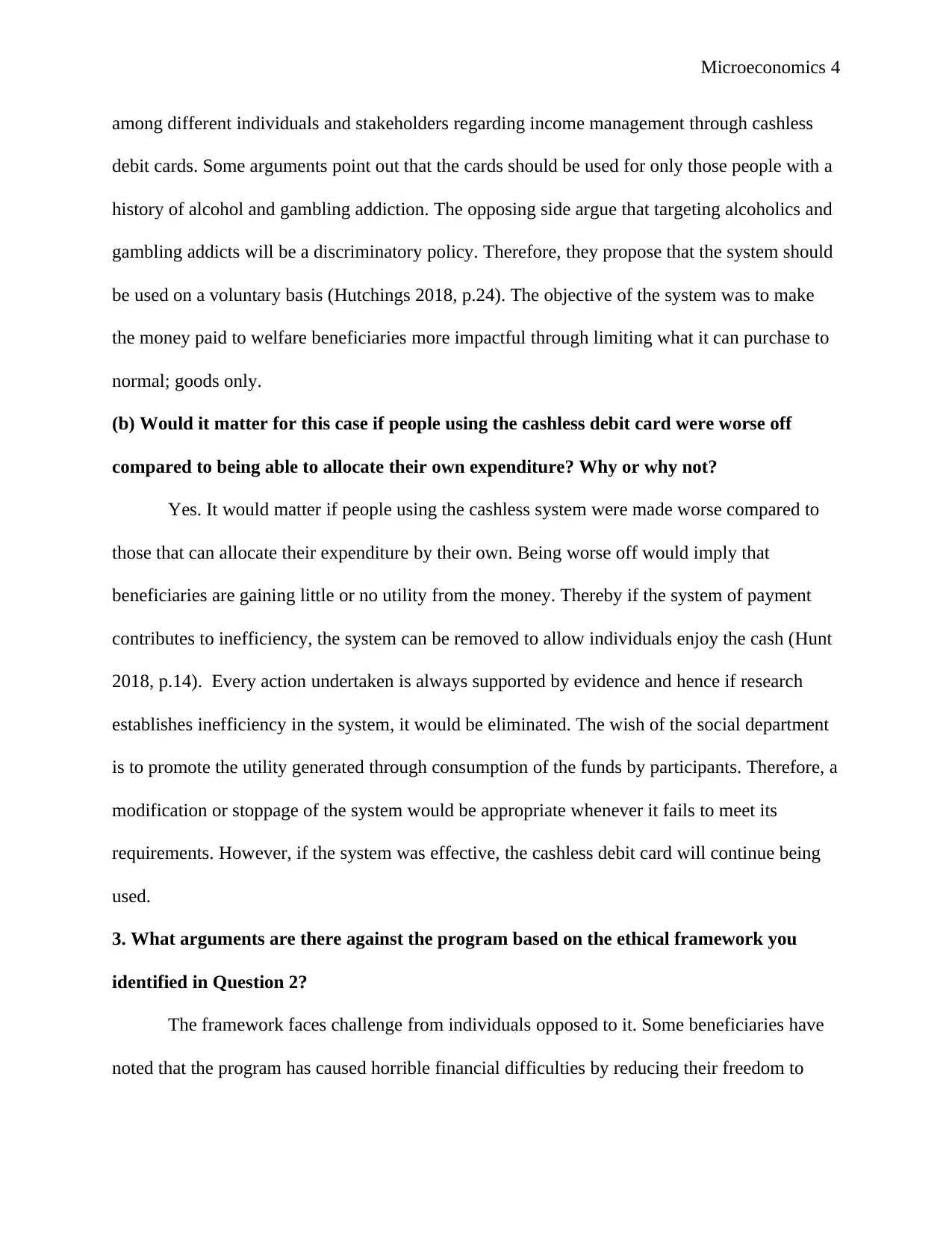
Microeconomics 4
among different individuals and stakeholders regarding income management through cashless
debit cards. Some arguments point out that the cards should be used for only those people with a
history of alcohol and gambling addiction. The opposing side argue that targeting alcoholics and
gambling addicts will be a discriminatory policy. Therefore, they propose that the system should
be used on a voluntary basis (Hutchings 2018, p.24). The objective of the system was to make
the money paid to welfare beneficiaries more impactful through limiting what it can purchase to
normal; goods only.
(b) Would it matter for this case if people using the cashless debit card were worse off
compared to being able to allocate their own expenditure? Why or why not?
Yes. It would matter if people using the cashless system were made worse compared to
those that can allocate their expenditure by their own. Being worse off would imply that
beneficiaries are gaining little or no utility from the money. Thereby if the system of payment
contributes to inefficiency, the system can be removed to allow individuals enjoy the cash (Hunt
2018, p.14). Every action undertaken is always supported by evidence and hence if research
establishes inefficiency in the system, it would be eliminated. The wish of the social department
is to promote the utility generated through consumption of the funds by participants. Therefore, a
modification or stoppage of the system would be appropriate whenever it fails to meet its
requirements. However, if the system was effective, the cashless debit card will continue being
used.
3. What arguments are there against the program based on the ethical framework you
identified in Question 2?
The framework faces challenge from individuals opposed to it. Some beneficiaries have
noted that the program has caused horrible financial difficulties by reducing their freedom to
among different individuals and stakeholders regarding income management through cashless
debit cards. Some arguments point out that the cards should be used for only those people with a
history of alcohol and gambling addiction. The opposing side argue that targeting alcoholics and
gambling addicts will be a discriminatory policy. Therefore, they propose that the system should
be used on a voluntary basis (Hutchings 2018, p.24). The objective of the system was to make
the money paid to welfare beneficiaries more impactful through limiting what it can purchase to
normal; goods only.
(b) Would it matter for this case if people using the cashless debit card were worse off
compared to being able to allocate their own expenditure? Why or why not?
Yes. It would matter if people using the cashless system were made worse compared to
those that can allocate their expenditure by their own. Being worse off would imply that
beneficiaries are gaining little or no utility from the money. Thereby if the system of payment
contributes to inefficiency, the system can be removed to allow individuals enjoy the cash (Hunt
2018, p.14). Every action undertaken is always supported by evidence and hence if research
establishes inefficiency in the system, it would be eliminated. The wish of the social department
is to promote the utility generated through consumption of the funds by participants. Therefore, a
modification or stoppage of the system would be appropriate whenever it fails to meet its
requirements. However, if the system was effective, the cashless debit card will continue being
used.
3. What arguments are there against the program based on the ethical framework you
identified in Question 2?
The framework faces challenge from individuals opposed to it. Some beneficiaries have
noted that the program has caused horrible financial difficulties by reducing their freedom to
Paraphrase This Document
Need a fresh take? Get an instant paraphrase of this document with our AI Paraphraser
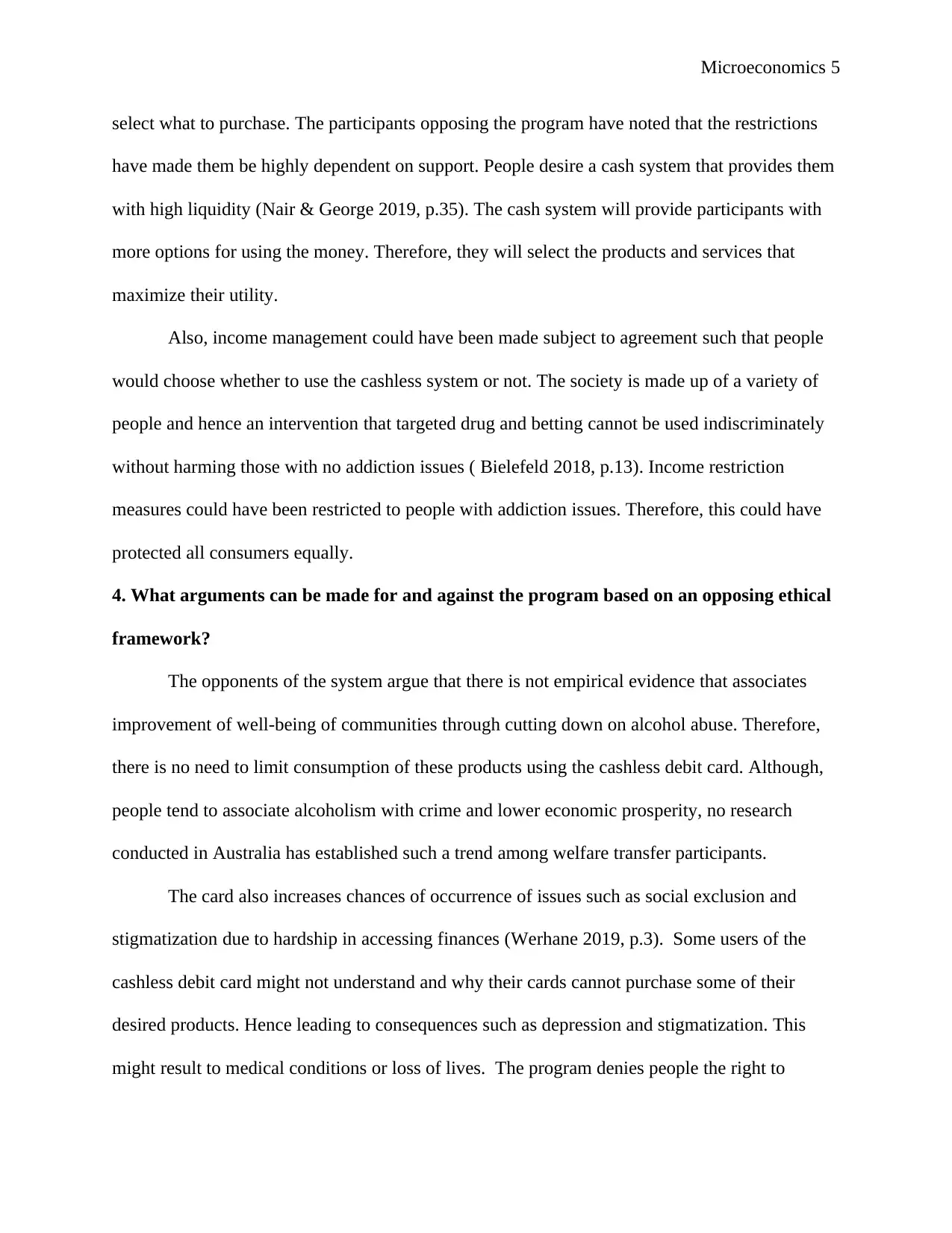
Microeconomics 5
select what to purchase. The participants opposing the program have noted that the restrictions
have made them be highly dependent on support. People desire a cash system that provides them
with high liquidity (Nair & George 2019, p.35). The cash system will provide participants with
more options for using the money. Therefore, they will select the products and services that
maximize their utility.
Also, income management could have been made subject to agreement such that people
would choose whether to use the cashless system or not. The society is made up of a variety of
people and hence an intervention that targeted drug and betting cannot be used indiscriminately
without harming those with no addiction issues ( Bielefeld 2018, p.13). Income restriction
measures could have been restricted to people with addiction issues. Therefore, this could have
protected all consumers equally.
4. What arguments can be made for and against the program based on an opposing ethical
framework?
The opponents of the system argue that there is not empirical evidence that associates
improvement of well-being of communities through cutting down on alcohol abuse. Therefore,
there is no need to limit consumption of these products using the cashless debit card. Although,
people tend to associate alcoholism with crime and lower economic prosperity, no research
conducted in Australia has established such a trend among welfare transfer participants.
The card also increases chances of occurrence of issues such as social exclusion and
stigmatization due to hardship in accessing finances (Werhane 2019, p.3). Some users of the
cashless debit card might not understand and why their cards cannot purchase some of their
desired products. Hence leading to consequences such as depression and stigmatization. This
might result to medical conditions or loss of lives. The program denies people the right to
select what to purchase. The participants opposing the program have noted that the restrictions
have made them be highly dependent on support. People desire a cash system that provides them
with high liquidity (Nair & George 2019, p.35). The cash system will provide participants with
more options for using the money. Therefore, they will select the products and services that
maximize their utility.
Also, income management could have been made subject to agreement such that people
would choose whether to use the cashless system or not. The society is made up of a variety of
people and hence an intervention that targeted drug and betting cannot be used indiscriminately
without harming those with no addiction issues ( Bielefeld 2018, p.13). Income restriction
measures could have been restricted to people with addiction issues. Therefore, this could have
protected all consumers equally.
4. What arguments can be made for and against the program based on an opposing ethical
framework?
The opponents of the system argue that there is not empirical evidence that associates
improvement of well-being of communities through cutting down on alcohol abuse. Therefore,
there is no need to limit consumption of these products using the cashless debit card. Although,
people tend to associate alcoholism with crime and lower economic prosperity, no research
conducted in Australia has established such a trend among welfare transfer participants.
The card also increases chances of occurrence of issues such as social exclusion and
stigmatization due to hardship in accessing finances (Werhane 2019, p.3). Some users of the
cashless debit card might not understand and why their cards cannot purchase some of their
desired products. Hence leading to consequences such as depression and stigmatization. This
might result to medical conditions or loss of lives. The program denies people the right to
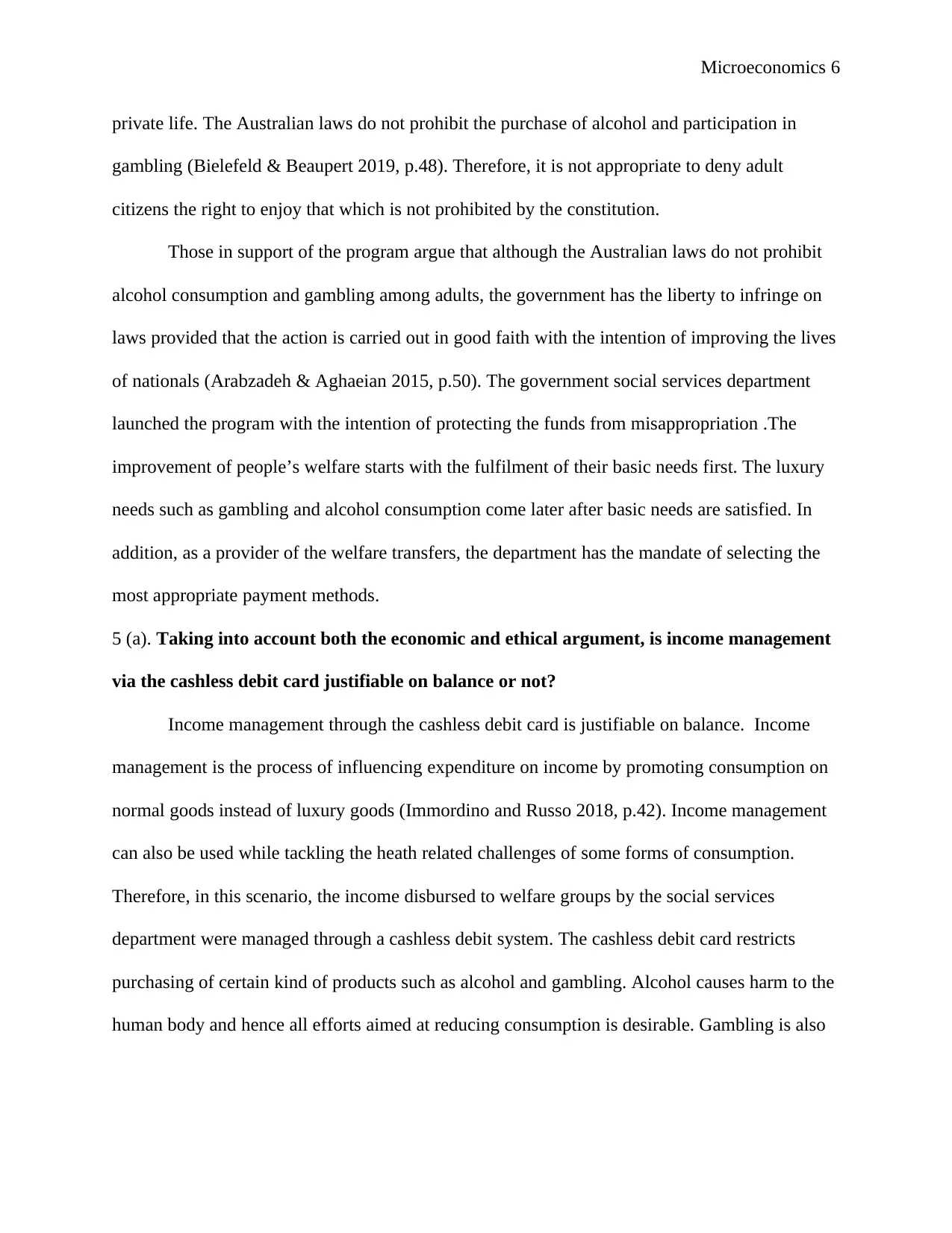
Microeconomics 6
private life. The Australian laws do not prohibit the purchase of alcohol and participation in
gambling (Bielefeld & Beaupert 2019, p.48). Therefore, it is not appropriate to deny adult
citizens the right to enjoy that which is not prohibited by the constitution.
Those in support of the program argue that although the Australian laws do not prohibit
alcohol consumption and gambling among adults, the government has the liberty to infringe on
laws provided that the action is carried out in good faith with the intention of improving the lives
of nationals (Arabzadeh & Aghaeian 2015, p.50). The government social services department
launched the program with the intention of protecting the funds from misappropriation .The
improvement of people’s welfare starts with the fulfilment of their basic needs first. The luxury
needs such as gambling and alcohol consumption come later after basic needs are satisfied. In
addition, as a provider of the welfare transfers, the department has the mandate of selecting the
most appropriate payment methods.
5 (a). Taking into account both the economic and ethical argument, is income management
via the cashless debit card justifiable on balance or not?
Income management through the cashless debit card is justifiable on balance. Income
management is the process of influencing expenditure on income by promoting consumption on
normal goods instead of luxury goods (Immordino and Russo 2018, p.42). Income management
can also be used while tackling the heath related challenges of some forms of consumption.
Therefore, in this scenario, the income disbursed to welfare groups by the social services
department were managed through a cashless debit system. The cashless debit card restricts
purchasing of certain kind of products such as alcohol and gambling. Alcohol causes harm to the
human body and hence all efforts aimed at reducing consumption is desirable. Gambling is also
private life. The Australian laws do not prohibit the purchase of alcohol and participation in
gambling (Bielefeld & Beaupert 2019, p.48). Therefore, it is not appropriate to deny adult
citizens the right to enjoy that which is not prohibited by the constitution.
Those in support of the program argue that although the Australian laws do not prohibit
alcohol consumption and gambling among adults, the government has the liberty to infringe on
laws provided that the action is carried out in good faith with the intention of improving the lives
of nationals (Arabzadeh & Aghaeian 2015, p.50). The government social services department
launched the program with the intention of protecting the funds from misappropriation .The
improvement of people’s welfare starts with the fulfilment of their basic needs first. The luxury
needs such as gambling and alcohol consumption come later after basic needs are satisfied. In
addition, as a provider of the welfare transfers, the department has the mandate of selecting the
most appropriate payment methods.
5 (a). Taking into account both the economic and ethical argument, is income management
via the cashless debit card justifiable on balance or not?
Income management through the cashless debit card is justifiable on balance. Income
management is the process of influencing expenditure on income by promoting consumption on
normal goods instead of luxury goods (Immordino and Russo 2018, p.42). Income management
can also be used while tackling the heath related challenges of some forms of consumption.
Therefore, in this scenario, the income disbursed to welfare groups by the social services
department were managed through a cashless debit system. The cashless debit card restricts
purchasing of certain kind of products such as alcohol and gambling. Alcohol causes harm to the
human body and hence all efforts aimed at reducing consumption is desirable. Gambling is also
⊘ This is a preview!⊘
Do you want full access?
Subscribe today to unlock all pages.

Trusted by 1+ million students worldwide
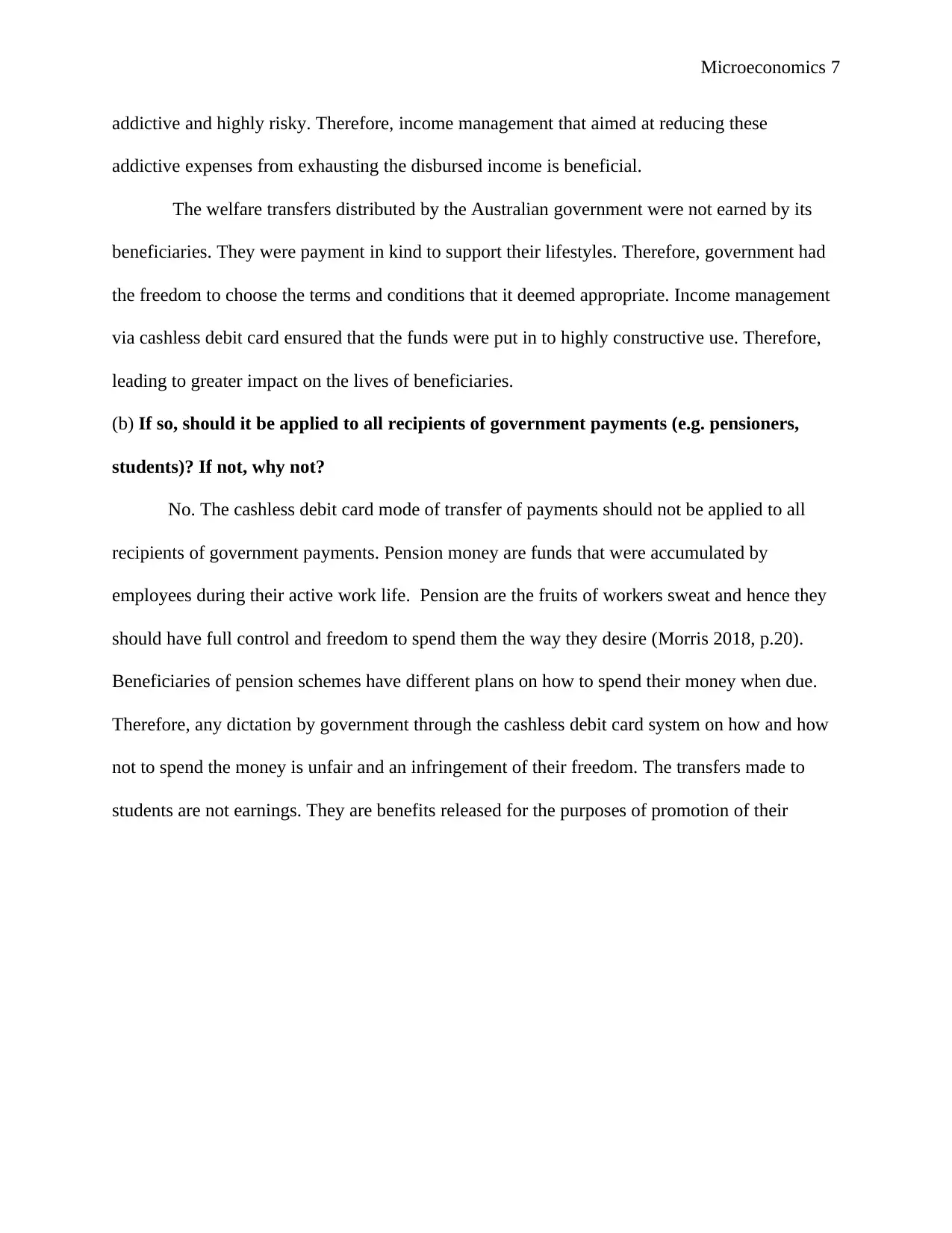
Microeconomics 7
addictive and highly risky. Therefore, income management that aimed at reducing these
addictive expenses from exhausting the disbursed income is beneficial.
The welfare transfers distributed by the Australian government were not earned by its
beneficiaries. They were payment in kind to support their lifestyles. Therefore, government had
the freedom to choose the terms and conditions that it deemed appropriate. Income management
via cashless debit card ensured that the funds were put in to highly constructive use. Therefore,
leading to greater impact on the lives of beneficiaries.
(b) If so, should it be applied to all recipients of government payments (e.g. pensioners,
students)? If not, why not?
No. The cashless debit card mode of transfer of payments should not be applied to all
recipients of government payments. Pension money are funds that were accumulated by
employees during their active work life. Pension are the fruits of workers sweat and hence they
should have full control and freedom to spend them the way they desire (Morris 2018, p.20).
Beneficiaries of pension schemes have different plans on how to spend their money when due.
Therefore, any dictation by government through the cashless debit card system on how and how
not to spend the money is unfair and an infringement of their freedom. The transfers made to
students are not earnings. They are benefits released for the purposes of promotion of their
addictive and highly risky. Therefore, income management that aimed at reducing these
addictive expenses from exhausting the disbursed income is beneficial.
The welfare transfers distributed by the Australian government were not earned by its
beneficiaries. They were payment in kind to support their lifestyles. Therefore, government had
the freedom to choose the terms and conditions that it deemed appropriate. Income management
via cashless debit card ensured that the funds were put in to highly constructive use. Therefore,
leading to greater impact on the lives of beneficiaries.
(b) If so, should it be applied to all recipients of government payments (e.g. pensioners,
students)? If not, why not?
No. The cashless debit card mode of transfer of payments should not be applied to all
recipients of government payments. Pension money are funds that were accumulated by
employees during their active work life. Pension are the fruits of workers sweat and hence they
should have full control and freedom to spend them the way they desire (Morris 2018, p.20).
Beneficiaries of pension schemes have different plans on how to spend their money when due.
Therefore, any dictation by government through the cashless debit card system on how and how
not to spend the money is unfair and an infringement of their freedom. The transfers made to
students are not earnings. They are benefits released for the purposes of promotion of their
Paraphrase This Document
Need a fresh take? Get an instant paraphrase of this document with our AI Paraphraser
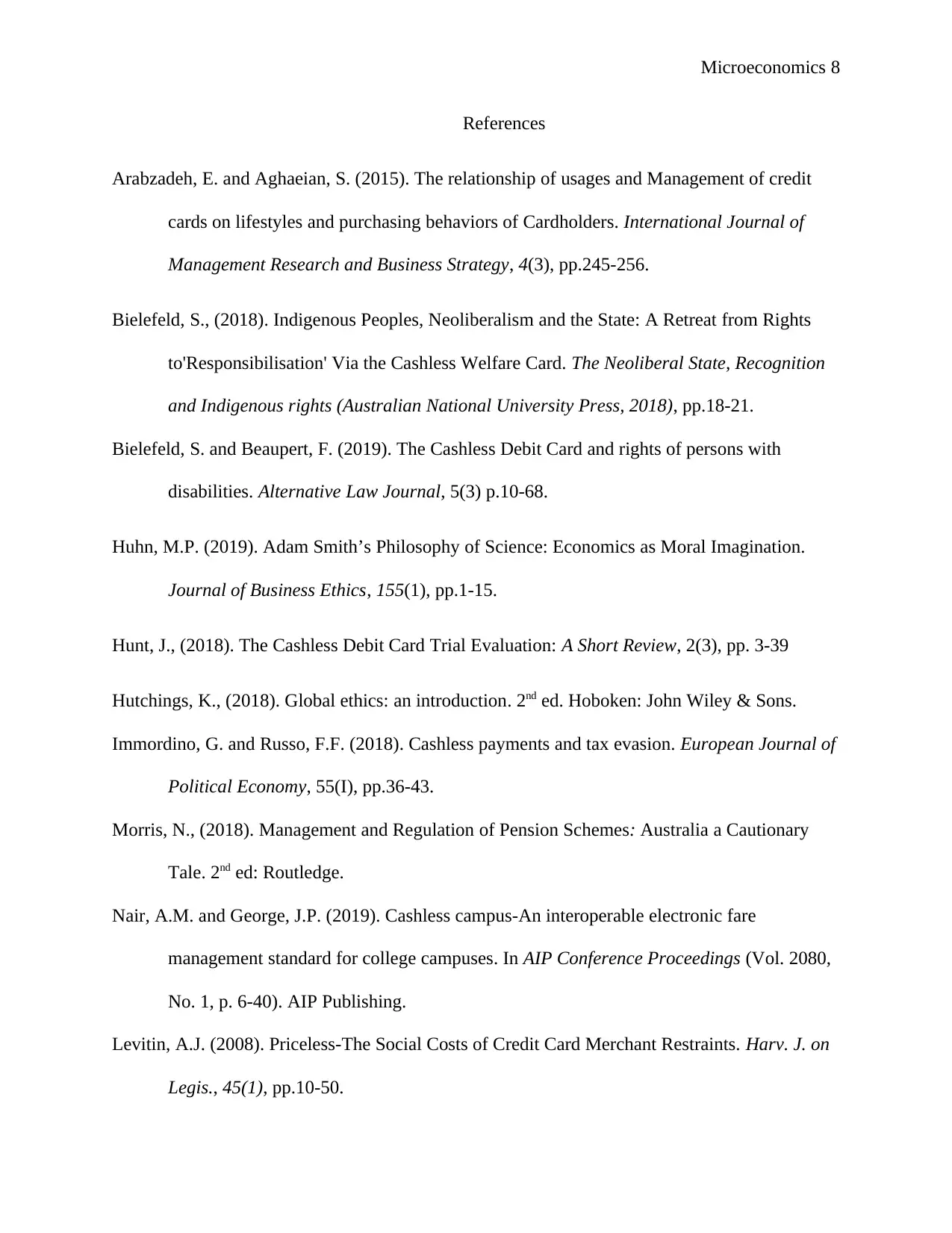
Microeconomics 8
References
Arabzadeh, E. and Aghaeian, S. (2015). The relationship of usages and Management of credit
cards on lifestyles and purchasing behaviors of Cardholders. International Journal of
Management Research and Business Strategy, 4(3), pp.245-256.
Bielefeld, S., (2018). Indigenous Peoples, Neoliberalism and the State: A Retreat from Rights
to'Responsibilisation' Via the Cashless Welfare Card. The Neoliberal State, Recognition
and Indigenous rights (Australian National University Press, 2018), pp.18-21.
Bielefeld, S. and Beaupert, F. (2019). The Cashless Debit Card and rights of persons with
disabilities. Alternative Law Journal, 5(3) p.10-68.
Huhn, M.P. (2019). Adam Smith’s Philosophy of Science: Economics as Moral Imagination.
Journal of Business Ethics, 155(1), pp.1-15.
Hunt, J., (2018). The Cashless Debit Card Trial Evaluation: A Short Review, 2(3), pp. 3-39
Hutchings, K., (2018). Global ethics: an introduction. 2nd ed. Hoboken: John Wiley & Sons.
Immordino, G. and Russo, F.F. (2018). Cashless payments and tax evasion. European Journal of
Political Economy, 55(I), pp.36-43.
Morris, N., (2018). Management and Regulation of Pension Schemes: Australia a Cautionary
Tale. 2nd ed: Routledge.
Nair, A.M. and George, J.P. (2019). Cashless campus-An interoperable electronic fare
management standard for college campuses. In AIP Conference Proceedings (Vol. 2080,
No. 1, p. 6-40). AIP Publishing.
Levitin, A.J. (2008). Priceless-The Social Costs of Credit Card Merchant Restraints. Harv. J. on
Legis., 45(1), pp.10-50.
References
Arabzadeh, E. and Aghaeian, S. (2015). The relationship of usages and Management of credit
cards on lifestyles and purchasing behaviors of Cardholders. International Journal of
Management Research and Business Strategy, 4(3), pp.245-256.
Bielefeld, S., (2018). Indigenous Peoples, Neoliberalism and the State: A Retreat from Rights
to'Responsibilisation' Via the Cashless Welfare Card. The Neoliberal State, Recognition
and Indigenous rights (Australian National University Press, 2018), pp.18-21.
Bielefeld, S. and Beaupert, F. (2019). The Cashless Debit Card and rights of persons with
disabilities. Alternative Law Journal, 5(3) p.10-68.
Huhn, M.P. (2019). Adam Smith’s Philosophy of Science: Economics as Moral Imagination.
Journal of Business Ethics, 155(1), pp.1-15.
Hunt, J., (2018). The Cashless Debit Card Trial Evaluation: A Short Review, 2(3), pp. 3-39
Hutchings, K., (2018). Global ethics: an introduction. 2nd ed. Hoboken: John Wiley & Sons.
Immordino, G. and Russo, F.F. (2018). Cashless payments and tax evasion. European Journal of
Political Economy, 55(I), pp.36-43.
Morris, N., (2018). Management and Regulation of Pension Schemes: Australia a Cautionary
Tale. 2nd ed: Routledge.
Nair, A.M. and George, J.P. (2019). Cashless campus-An interoperable electronic fare
management standard for college campuses. In AIP Conference Proceedings (Vol. 2080,
No. 1, p. 6-40). AIP Publishing.
Levitin, A.J. (2008). Priceless-The Social Costs of Credit Card Merchant Restraints. Harv. J. on
Legis., 45(1), pp.10-50.
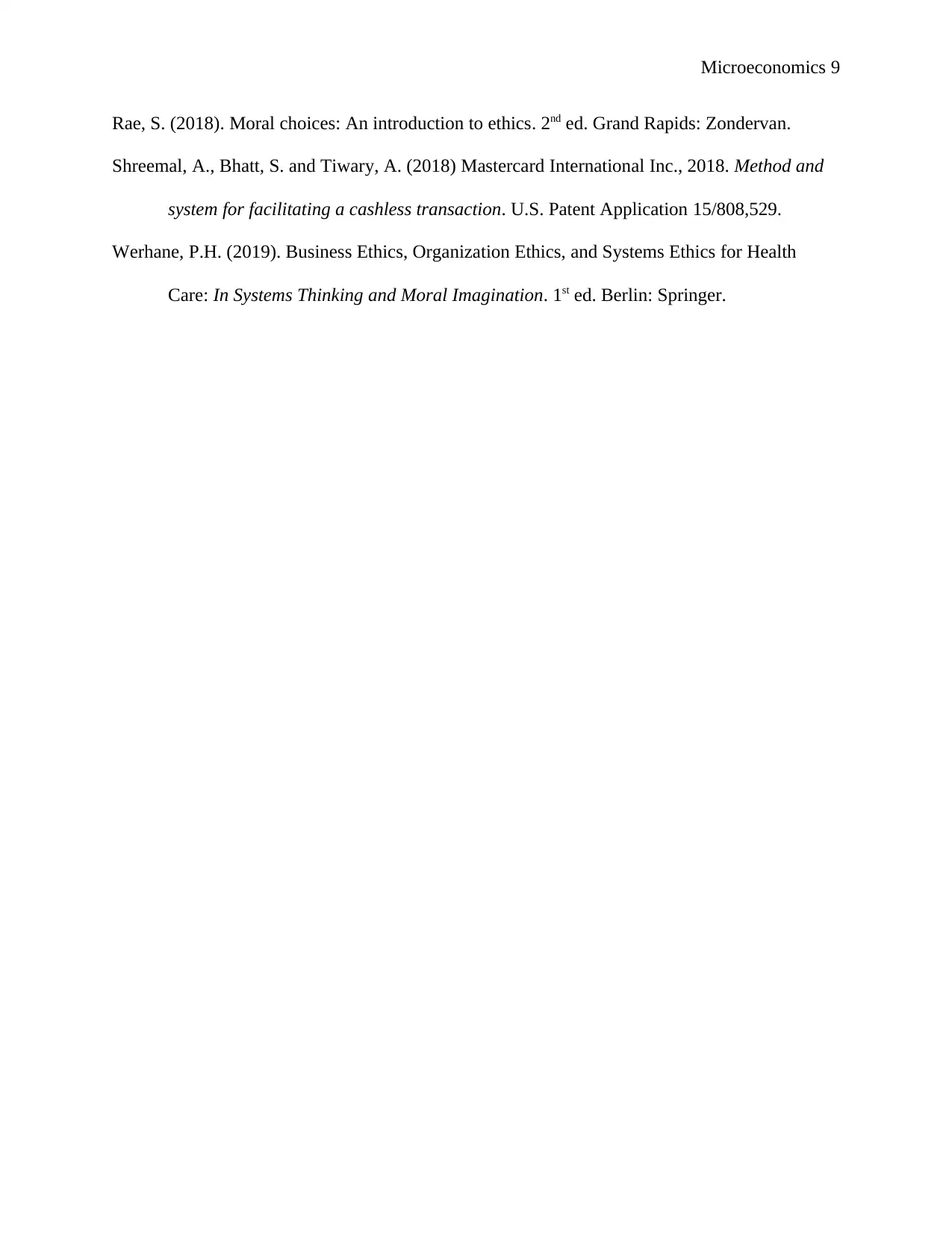
Microeconomics 9
Rae, S. (2018). Moral choices: An introduction to ethics. 2nd ed. Grand Rapids: Zondervan.
Shreemal, A., Bhatt, S. and Tiwary, A. (2018) Mastercard International Inc., 2018. Method and
system for facilitating a cashless transaction. U.S. Patent Application 15/808,529.
Werhane, P.H. (2019). Business Ethics, Organization Ethics, and Systems Ethics for Health
Care: In Systems Thinking and Moral Imagination. 1st ed. Berlin: Springer.
Rae, S. (2018). Moral choices: An introduction to ethics. 2nd ed. Grand Rapids: Zondervan.
Shreemal, A., Bhatt, S. and Tiwary, A. (2018) Mastercard International Inc., 2018. Method and
system for facilitating a cashless transaction. U.S. Patent Application 15/808,529.
Werhane, P.H. (2019). Business Ethics, Organization Ethics, and Systems Ethics for Health
Care: In Systems Thinking and Moral Imagination. 1st ed. Berlin: Springer.
⊘ This is a preview!⊘
Do you want full access?
Subscribe today to unlock all pages.

Trusted by 1+ million students worldwide
1 out of 9
Related Documents
Your All-in-One AI-Powered Toolkit for Academic Success.
+13062052269
info@desklib.com
Available 24*7 on WhatsApp / Email
![[object Object]](/_next/static/media/star-bottom.7253800d.svg)
Unlock your academic potential
Copyright © 2020–2025 A2Z Services. All Rights Reserved. Developed and managed by ZUCOL.





